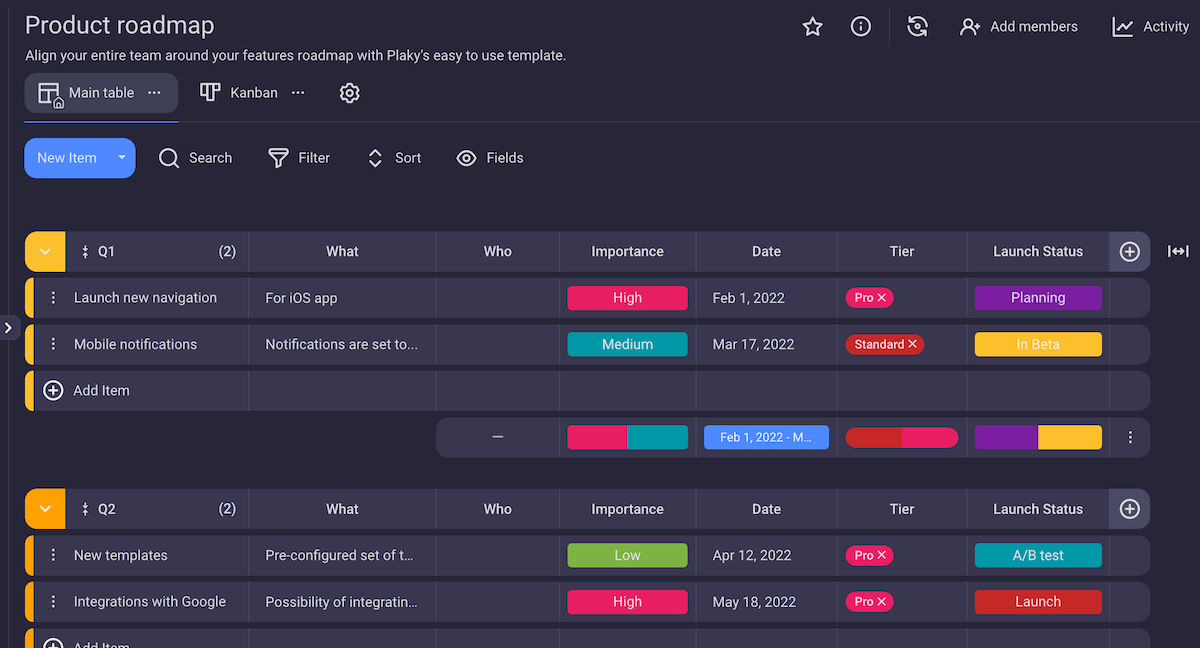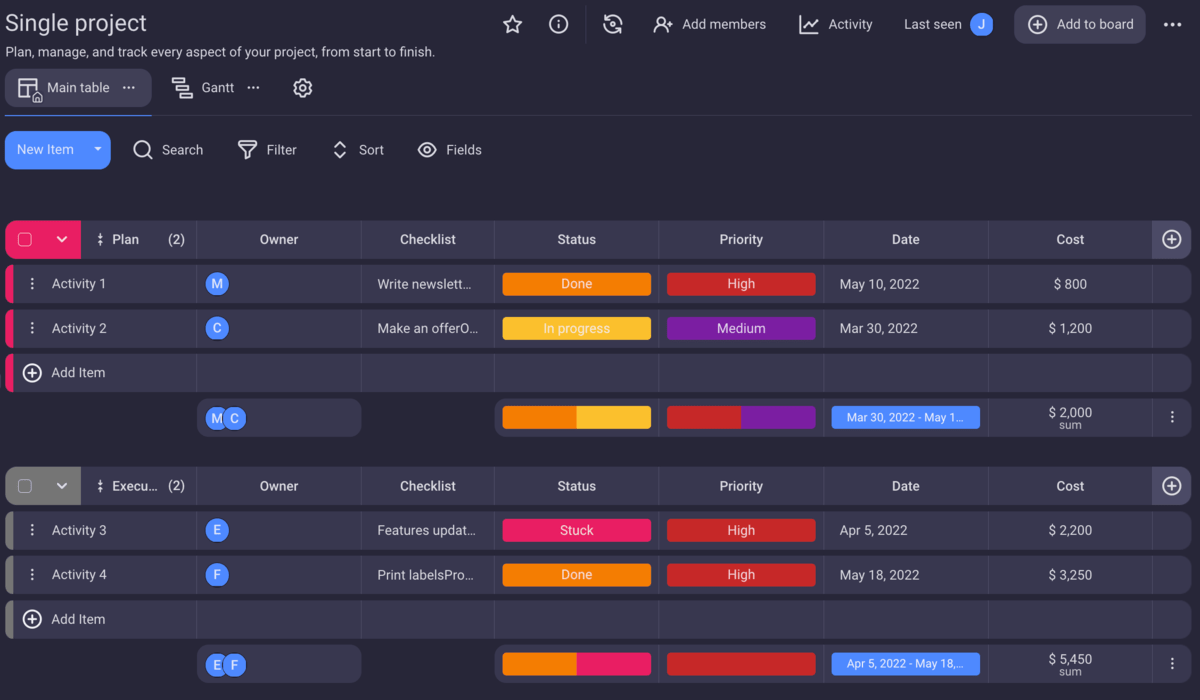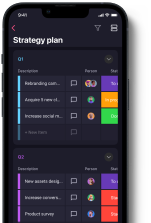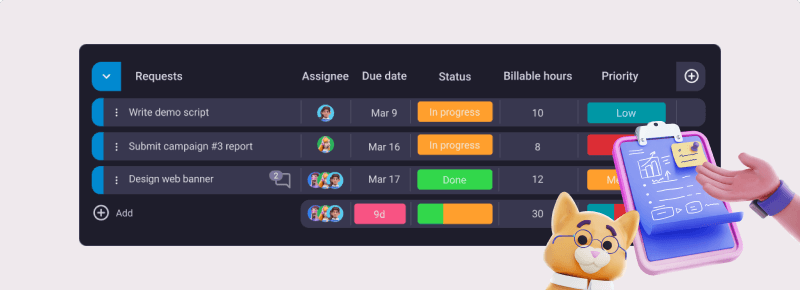Let’s say you’re just starting a project whose goal is to create a product, and you’re trying to figure out what roles you need to fill.
You need someone who understands the customer base, who has technical knowledge of the creation process, and who can envision the best version of your product. Someone who can guide product development in the right direction.
You’d be forgiven for latching on to the last responsibility we listed and getting a project manager. But, you’d soon see that a Product Owner might have been a better option.
So, let’s see what the distinction is — how a project manager and a Product Owner are different, and where they overlap.

Table of Contents
Product Owner vs project manager: Key Differences
The Product Owner is in full control of the vision for the product, whereas the project manager runs the project. They cannot change the Product Owner’s vision, only execute it. The project manager handles most of the task management, while the Product Owner only handles the Product Backlog.
It’s important to note that a Product Owner and a project manager are rarely seen working on the same project. This is because a Product Owner is typically part of a Scrum Team, which has no project managers.
With that in mind, here’s a table comparing some of the main aspects of these roles, highlighting their most important differences.
| Aspect | Product Owner | Project manager |
|---|---|---|
| Function | Serves as an internal customer expert Develops the Product Goal Creates and maintains the Product Backlog | Supervises the project Makes sure that the deadlines are met Manages complex work across many teams |
| Collaboration | Works closely with other members of the Scrum Team to deliver and maintain the Product Goal | Works with the project team, and sometimes, the stakeholders, to supervise the realization of the project |
| Product vision | Creates a vision according to customer needs Takes part in the execution of the vision | Executes the vision |
| Leadership role | Inspires the team and steers them in the right direction | Leads and inspires people to do their part of the job and deliver output |
| Managing the process | Maintains only the Product Backlog | Cares about the details of creating, managing, and assigning work to the members of the team |
| Yearly earnings | Has an average salary of $115,869 per year | Has an average salary of $84,950 per year |
The Product Owner supervises the product, while the project manager supervises the project
The Product Owner literally owns the product vision. They are responsible for developing the product strategy and goals, optimizing them, deciding what features need to be built, and managing the Product Backlog.
On the other hand, a project manager runs the project. They delegate project tasks and make sure they get done within the project constraints.
The Product Owner, more than anyone, needs to understand the ideal customer. They are the ones who build the customer profile and analysis.
They use this knowledge to create the concrete Product Goal. Project managers set project goals, but unlike POs, they are not responsible for the product vision.
A Product Owner collaborates more closely with the team
A Product Owner’s approach to collaboration is a lot more hands-on than a project manager’s.
The project manager has to ensure project deadlines are met and set and assign project tasks. However, this doesn’t necessarily mean they need to maintain communication with the team on a day-to-day basis.
On the contrary, if they set clear expectations, constant communication will not be necessary, and it will revolve around checking in to make sure that everything is running smoothly.
A Product Owner, however, needs to always be available to the team. The team needs to understand what they are creating, and why, so they turn to the Product Owner for any burning questions. They’re also essential for providing feedback on product development.
Daily scrum meetings are essential to a Product Owner, due to Scrum’s iterative nature. They will often optimize the product vision during the development process.
A Product Owner creates the product vision, while the project manager executes it
As the Product Owner works as the internal product expert, with a complete understanding of the customer profile, they use that knowledge to create a vision based on the customers’ needs.
Furthermore, a Product Owner is responsible for the product’s development, so they are in full control of the product — they set the Product Goal and change it accordingly at any point.
On the other hand, the project manager doesn’t have that freedom or that responsibility. They cannot influence the product goals, rather, their job is to execute them.
This is done through the meticulous crafting of a project plan, which incorporates the project goals. They need to care for the project resources — to best utilize them in the creation of the product.
A Product Owner motivates the team, while a project manager leads it
You can imagine a Product Owner as the navigator of a ship, while a project manager is the captain — even though they’re rarely seen on the same ship.
Product Owners are there to steer the team in the right direction, through constant communication with the team. They are able to motivate the team properly, as they work closely with them.
A project manager is there to ensure that tasks are completed on time and that they’re done right. Their leadership skills need to be more refined, as the team will turn to them regarding any issues with the project itself and the way it is executed.
A Product Owner manages the Backlog, while the project manager manages everything else
When dealing with concrete tasks and managing them, a Product Owner’s sole responsibility lies in creating and maintaining the Product Backlog.
Not to downplay its importance — the Backlog is the backbone of the project.
On the other hand, the project manager needs to organize the backlog into an executable project. They need to calculate task dependencies, plan and assign tasks, allocate resources, and determine deadlines — all in accordance with the project constraints, plan, scope, etc.
A Product Owner earns more than a project manager
According to Glassdoor, the average salary of project managers is $84,950, whereas the average salary of Product Owners is $115,869 per year.
So, on average, Product Owners earn more than project managers. But, this doesn’t necessarily have to be the case and can depend on many factors — such as the industry, organization, location, etc.
💡 Plaky Pro Tip
In case you want to read more about project manager salaries, check out this guide:
Shared characteristics of Product Owners and project managers
The role of the Product Owner is closely related to the Scrum framework, whereas the project manager position is much broader.
Nevertheless, there are some traits we could say define both of these roles:
- They need to be collaborative and have great communication skills.
- They both need to be well organized.
- They both need to have some level of technical knowledge, although Product Owners need more of it.
- They should both have leadership and motivational skills.
- They both work on steering the team towards the product/project goal.
Who is a Product Owner?
In short, the Product Owner is a person who is primarily concerned with increasing the value of a product that the team creates. The Product Owner’s job is to turn an idea into a product.
A Product Owner is a role closely related to Scrum — an Agile framework that allows teams to quickly and effectively communicate and adapt to solving complex issues in a circular process.
There are 3 roles in the Scrum Team — and here’s how the Product Owner fits in:
- Scrum Master — makes sure that the team members achieve success both individually and as a team by guiding them and helping with Scrum implementation,
- Developers — work on creating and developing the increment that leads to the achievement of the goal, and
- Product Owner — responsible for maximizing the product’s value.
As evident, Scrum typically does not involve the position of the project manager.
The team has faith in the Product Owner’s oversight of both the beginning of the project and potential scope changes that might occur as the product develops.
What are the Product Owner’s responsibilities?
The responsibilities of a Product Owner are:
- Developing a clear Product Goal and clearly communicating that goal to the team,
- Creating and managing the Product Backlog — i.e., a list detailing what needs to be done by the team to create and sustain the product,
- Representing stakeholders and customers’ needs,
- Ensuring that the Product Backlog items are visible, straightforward, and that they present what the Scrum Team will work on next,
- Making sure that everyone’s focused on the goals that should be achieved and that everyone has the same product vision,
- Taking care of the Product Backlog, delivery dates, product progress, and the steps that will be taken next,
- Increasing the value of the product by making choices on what to include and what not to include in the product,
- Granting continuous and clear product support, and
- Taking care of the budget for the product, the overall cost of ownership, and managing, sharing, and constructing the vision of the product.
What are NOT the Product Owner’s responsibilities?
The Product Owner should not:
- Be responsible for the team’s effectiveness — this is the Scrum Master’s job.
- Be responsible for managing day-to-day work — this is the job of the developers.
- Be responsible for removing obstacles during work — the Scrum Master should do that.
- Be responsible for establishing a Scrum framework — this is another Scrum Master responsibility.
- Act like a doorkeeper between the stakeholders and the team — Product Owners do represent the stakeholders’ needs, but the entire Scrum Team communicates the results and progress of their work to stakeholders.
Which skills or characteristics does the Product Owner have?
While being a Product Owner requires a diverse set of skills, the 3 most important ones are:
- Decision-making — they should be able to recognize opportunities to improve on the Product Goal. Also, they should make mindful decisions that minimize the chances of product failure.
- Adaptability skills — they should be flexible and dynamic. As they work in an environment that changes constantly, Product Owners should adapt quickly based on the feedback they get.
- Industry knowledge — they should be able to understand the industry and the market which they create the product for.
Who is a project manager?
A project manager is a much broader term than a Product Owner.
A project manager is the leader of the team responsible for achieving the goals of the project.
Project managers work in closed and well-defined systems. Their primary function is to make sure the project goals are reached within a certain time frame on a predefined budget.
However, the goal of the project does not always have to be a product. It can be, for example, the implementation of a new information system or improving a process within an organization.
So, the role of the project manager is not strictly defined like the role of the Product Owner. It often depends on the company that they work for and the project they are working on.
The project manager can also work in many different methodologies, while Product Owners are only seen in Agile teams, especially Scrum.
💡 Plaky Pro Tip
If you want to get experience in project management, check out this text:
What are the project manager’s responsibilities?
The project manager’s role is broad and extensive, including:
- Controlling the project organization,
- Defining project objectives,
- Defining project scope,
- Creating a task schedule and defining its duration,
- Creating and managing project plans,
- Managing changes and change requests,
- Tracking and measuring the progress of the team working on the project,
- Maintaining the quality of the project team’s work,
- Managing project risks,
- Supervising the execution of the project in project management tools,
- Managing project documentation,
- Managing project resources, and
- Closing the project.
💡 Plaky Pro Tip
Which traits should you have to be a great project manager? Find out below:
What are NOT the project manager’s responsibilities?
It is pretty hard to say what the project manager does not do as their role might depend on the industry, the methodology, and the company itself.
It is not the project manager’s job to take care of the individual tasks. The project manager should only:
- Set the tasks,
- Assign team members to specific tasks,
- Provide guidance on how to execute them.
After the project manager has completed this, the project team works on the specific tasks.
Which skills or characteristics should a project manager have?
Apart from the technical skills that a project manager might need, there are certain soft skills and characteristics that are associated with this role — for example:
- Leadership skills — project managers lead people through the project and make sure that everyone is doing their job. It’s important that they’re able to inspire and motivate their team.
- Communication skills — to make sure that the job is done properly, the project manager should know how to communicate well with their team, clients, and stakeholders.
- Negotiating skills — to keep the project on track, remove obstacles, and complete the project on time, they should know how to negotiate the project terms with stakeholders.
- Time management skills — project managers need to know how to take care of the project deadlines and ensure that no part of the process takes longer than needed.
- Risk management skills — project managers should know how to identify, address, and manage project risks effectively.
💡 Plaky Pro Tip
If you want to learn how to become a successful project manager, check out this more detailed guide on project management skills:
Plaky helps Product Owners and project managers stay organized
Good organization of teams and tasks is key to successful projects. This is where Plaky comes into play to help both Product Owners and project managers.
Namely, Plaky is free project management software you can use to:
- Organize projects and processes effectively,
- Assign team members to tasks and delegate responsibilities,
- Get real-time updates and track project progress,
- Share task-related files and documents, and so much more.
With Plaky, Product Owners can easily unite their teams around a product roadmap and even break it into manageable phases. Plaky offers a free product roadmap template, so there’s no need to start from scratch.

When it comes to project managers, Plaky has a plethora of features that can help them nail their projects and manage teams with no trouble.

Each project has its own dedicated space so you can have a bird’s eye view of all tasks, assignees, and files. Make use of a single project template, and start planning and managing projects with confidence.
Take control of your workload and sign up for a free Plaky account today.







